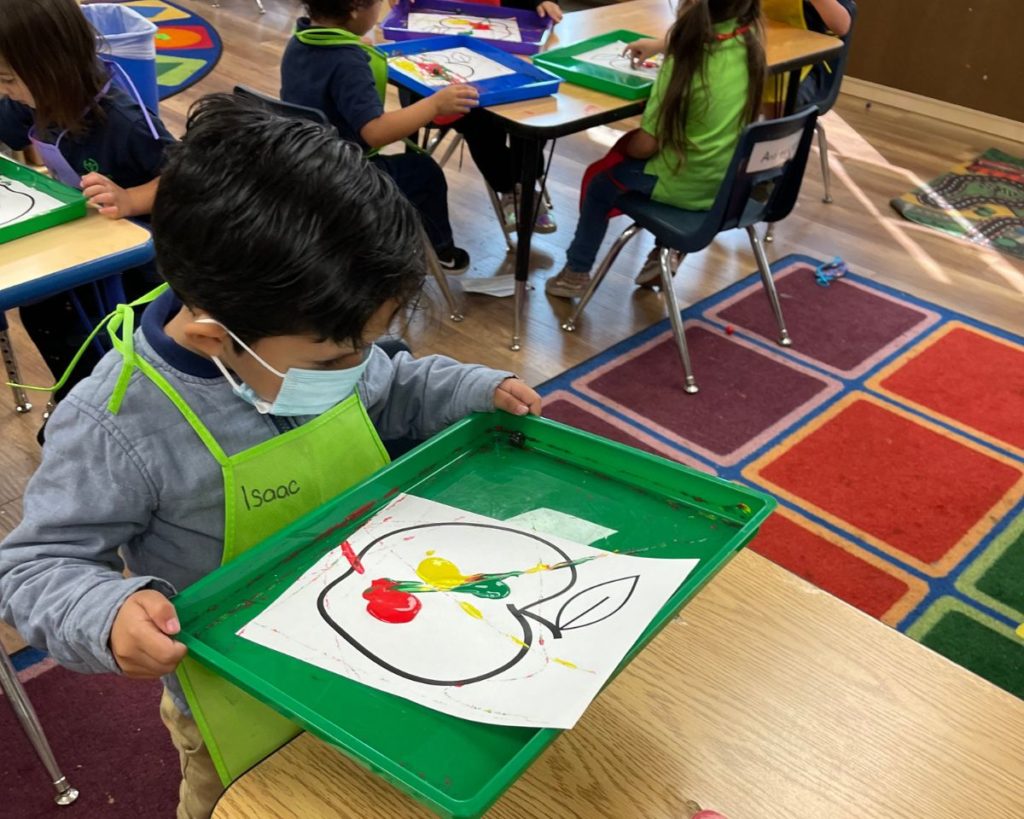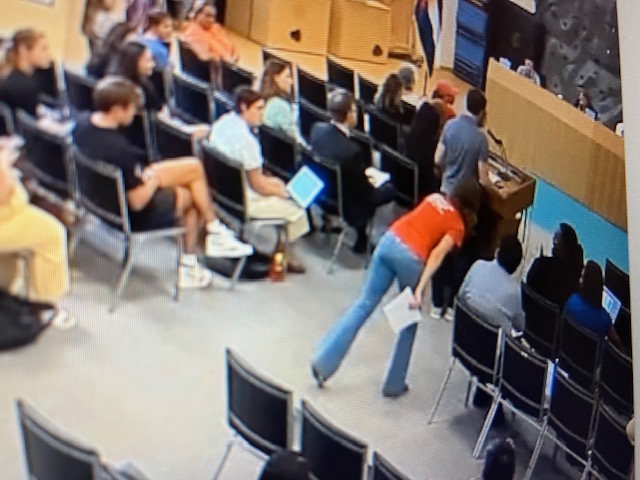The building stands out on Denver’s busy East 47th Avenue like a solitary, over-sized birthday present. It’s a bleached white, boxy, four-story structure adorned with a bright blue strip that circles the entire third floor.
It houses Academy 360, a Denver public charter school. Academy 360 is part of a consortium of Denver charter schools dedicated to backfilling some of the intellectual and social gullies carved out by Covid-19.
The pandemic, which caused an unprecedented shuttering of schools across Colorado and the country, created an educational and emotional and social challenge not seen in this country since, perhaps, The Great Influenza a century before.
Governments, think tanks, and academic researchers will stay busy for decades studying the adverse impacts—educational, social and emotional—that the pandemic had on the learning of younger, high-risk children and especially those in low income groups who entered the pandemic at a vulnerable time and often with their own unique challenges.
Funding for this and other similar summer programs across the state were part of Governor Jared Polis’ $32 million Response, Innovation, and Student Equity Education (RISE) effort to bolster the needs of “districts, charter schools, and public institutions of higher education.” The grant are intended to aid in closing “equity gaps, and enhance operational efficiency for pre-K-12 through higher education.”
Nine Denver charter schools, including Academy 360, joined together and won a $595,700 RISE grant last year, with funding continuing through this summer. In total, the grant application says, the schools enroll “2,000 of Colorado’s highest-need students. (The grant gives them) the opportunity to participate in innovative extended-school-year programs that include academic, social- emotional, and experiential components.”
The other schools involved are: RiseUp Community School, AUL Denver, two campuses of Colorado High School, two campuses of Highline Academy, and the Girls Athletic Leadership School’s middle and high schools.
At Academy 360, summer classes are tailored to ensure a healthy and workable teacher-to-student ratio. During the school year, the student-teacher ratio is between 15- and 20-1 with one teacher’s aide in each classroom. But here the eight-week, grant-financed DPS summer program that runs June through July, is a bit more intimate.
Academy 360 Executive Director and principal Becky McLean thought it made more sense for this summer intensiveto shrink the student-teacher ratio to 10-1.
“We really tried to support our teachers, giving them less students so they could really individualize education for each individual student for success,” McLean said. “Knowing how disrupted their academics were at grade K and 1, knowing how they were rising, it just made sense to split our classrooms this way.”
In the classrooms, teachers are allowed to work on a more intimate level with the students who come from a number of Denver zip codes. A good portion of the students are from Montbello and nearby Green Valley Ranch, McLean said.
Others come from communities including Commerce City, west Denver, and from the Northfield and Central Park areas, McLean said. School begins each day at 8 a.m. and ends at 3:30 p.m. Breakfast and lunch are provided each day. There is also a dedicated recess each day.
Students are taught the same academic classes, including physical education, that they would have in a normal school year. Field trips are also part of the eight-week program.
In addition, said McLean, various individuals and companies are invited to come to the Academy 360 campus for on-site presentations if it is germane to what students might be studying. It’s a teaching approach that is a light year from the proverbial ‘three R’s,’ but the results are positive.
While the teaching approach is more relaxed, McLean and Kristen Freeman, Academy 360’s Director of Academics and Instruction, are firm in stressing the summer program is a serious educational undertaking and not a summer camp and certainly not babysitting.
“People who say we’re babysitting or doing daycare” McLean said, “don’t live in this world, don’t understand it.”
“We staff very meaningfully,” Freeman said. Adults who come to work at the school are given “the tools to help kids develop not only academically but in their social and emotional skills.” She rejects the belief that programs like Academy 360’s summer school are “just sitting by the campfire and playing games.”
Staff, she said, is fully engaged and working with kids on academics as well as helping them catch up on skills that are essential both inside and outside classroom settings, not the least of which are the skills necessary in navigating everyday situations when there may be simple disagreements.
Additionally, said Freeman, a 12-year classroom veteran, students are taught how to advocate for their needs when they come into school and might be dealing with something as ordinary as fatigue caused by not sleeping well or sometimes not even having a place to sleep.
Freeman said something as basic as lack of sleep and exhaustion has the potential to trigger a negative reaction if a student doesn’t have the tools to handle it before it escalates.
Covid had the unintended consequence of dramatically changing the arc of a child’s life, especially one who lost a parent, or both, or a custodial grandparent or grandparent caregiver.
A National Institutes of Health study determined that children who, for the most part were not physical victims of the virus, were still among Covid’s stealth casualties. They lost the very people who provided everything they needed, from food and shelter to emotional bonding. NIH estimates that more than 140,000 children lost a primary or secondary caregiver during the pandemic.
The loss of a central figure in a child’s life, what researchers call an adverse childhood experience (ACE), has been linked to mental health issues and lower self-esteem. NIH says these children may one day be at higher risk for substance abuse, suicide, violence, sexual abuse and exploitation.
More immediately, Covid’s upheaval caused many of the children impacted by these losses to uproot their lives, forcing them to move, change schools, say goodbye to friends while trying to make new ones.
Losing these important anchors, for some, resulted in a whole new reality—becoming homeless, living in cars or in shelters. The foundational upheaval took on many forms and the emotional impact registered deeply. The NIH study also said the pandemic had a disproportionate impact on students of color.
Teachers, including those at Academy 360, are eyewitnesses to the unspoken side of the pandemic on a daily basis. “What we have seen is that kids who would have typically had certain social skills, you know, maybe they threw tantrums at five,” said Freeman, “we’re now seeing seven and eight-year-olds who are now throwing tantrums because they can’t have their choice activities, who are struggling to create meaningful friendships with peers and adults because they haven’t had to do that at home the last two years.”
For that reason and others, Academy 360 designed a four-color behavioral code—blue, yellow, green and red—that is placed in each classroom. Students use the code to express how they’re feeling. Blue means ‘I’m really tired,’ or ‘I don’t feel well; Yellow indicates, ‘I’m feeling a little bit silly or squiggly;’ Green signifies, ‘I’m ready to learn;’ Red, ‘I’m really, rally mad or sad.’ Children are encouraged to name the color that best describes their mindset or mood, said Freeman.
The color chart has been surprisingly successful in creating a more comfortable, more conducive learning environment for both students and staff. But at Academy 360, little is left to chance and even the obvious gets a second look, including things that may surprise.
One such example, said Freeman, takes place in the Academy 360 art classes where students use basic art supplies. It’s not as simple as one might think, Freeman said.
“They use technology better than a lot of teachers,” said Freeman. But over the nearly two-year period of the pandemic instead of using things as basic as scissors, glue or paints, they were using cell phones, smart tablets and computers.
“When you give them a pair of scissors and glue and ask them to do a fine motor task,” said Freeman, you don’t always get the outcome you expect. “That is sometimes very challenging.”
It takes a while to reintroduce using the motor skills to use scissors. Practicing something as simple as using scissors, she said, “helps develop those muscles that need to be developed in the future when they have to write.”
While the summer program is focused on results, the one-on-one connections between teacher and students are also front-and-center.
Both McLean and Freeman each take time to visit the various classrooms and engage with the students. The affection for ‘Becky’ or ‘Kristen,’ as they are often addressed, is evident with many of the students rushing to share a hug or to proudly show the results of a project.
McLean says it has been more than a worthwhile investment. But it’s unclear whether additional grants will be available to bring the program and students back next summer.
Also, said McLean, if the program does return, there is no guarantee that there will be adequate staff to run things. “A lot of teachers,” she said, “are just burned out” and leaving the profession.
Like so many new realities Covid introduced, long hours, exhaustion and new economic realities. The trifecta opened the exit doors and a lot of teachers are walking out.




